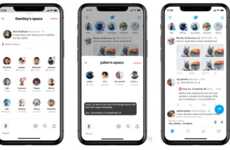
Twitter Purchased Breaker to Help Build Twitter Spaces
Daniel Johnson — January 7, 2021 — Tech
References: blog.breaker.audio & techcrunch
Twitter recently acquired a social broadcasting app named Breaker in order to improve Twitter’s main platform but also to help develop Twitter Spaces, which is an audio-focused project.
The acquisition of the broadcasting app was announced on the Breaker company blog, which also stated that the Breaker app will close down beginning on January 15, 2021. Leah Culver, the CTO of Breaker indicated that she will now work primarily on Twitter Spaces. Twitter Spaces is a platform similar to Twitter, however, it allows users to communicate in real-time with their voice, instead of text.
“Here at Breaker, we’re truly passionate about audio communication and we’re inspired by the ways Twitter is facilitating public conversations for people around the world,” said Erik Berlin, the CEO of Breaker.
Image Credit: Twitter
The acquisition of the broadcasting app was announced on the Breaker company blog, which also stated that the Breaker app will close down beginning on January 15, 2021. Leah Culver, the CTO of Breaker indicated that she will now work primarily on Twitter Spaces. Twitter Spaces is a platform similar to Twitter, however, it allows users to communicate in real-time with their voice, instead of text.
“Here at Breaker, we’re truly passionate about audio communication and we’re inspired by the ways Twitter is facilitating public conversations for people around the world,” said Erik Berlin, the CEO of Breaker.
Image Credit: Twitter
Trend Themes
1. Social Broadcasting Apps - The rise of social broadcasting apps presents an opportunity for businesses to experiment with live audio and connect with their audience in new and engaging ways.
2. Real-time Audio Communication - The development of real-time audio communication tools provides businesses with the opportunity to have a more personal and interactive experience with their audience.
3. Acquisition of Audio-based Technologies - Acquiring audio-based technologies can be an effective strategy for businesses looking to enhance their product offerings or develop new products altogether.
Industry Implications
1. Social Media - Social media companies have an opportunity to integrate audio-based features into their platforms, creating more engaging and immersive experiences for their users.
2. Podcasting - Podcasting companies can expand their offerings by incorporating real-time audio communication tools, allowing for more interactive and engaging content for their audience.
3. Marketing - Marketers can leverage the rise of social broadcasting apps and real-time audio communication to connect with consumers in new and innovative ways and develop more personalized marketing campaigns.
0.7
Score
Popularity
Activity
Freshness























